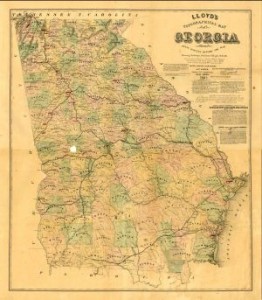 Today Charleston, Illinois, a small town sharply divided over the war, erupts in rioting. The trouble begins when Copperheads (Northern Democrats who want to sign a peace treaty with the Confederate States) assemble at the courthouse. Armed and ready for confrontation, the Copperheads wait for opportunities to assault soldiers and abolitionists.
Today Charleston, Illinois, a small town sharply divided over the war, erupts in rioting. The trouble begins when Copperheads (Northern Democrats who want to sign a peace treaty with the Confederate States) assemble at the courthouse. Armed and ready for confrontation, the Copperheads wait for opportunities to assault soldiers and abolitionists.
The wait is not long, as a soldier from the 54th Illinois Infantry confronts the hostiles. Shots ring out. For the next several hours, the town is engulfed in chaos as Copperheads and soldiers of the 54th Illinois fight with guns and fists. Not until Union army reinforcements from Mattoon arrive is the scuffle brought under control. Six soldiers and two agitators are dead, while in the days following the army hunts down those guilty of starting the fight and holds an inquest.
Local tensions, to be certain, are not confined to the North.
The state of Georgia is on edge as spring arrives and federal forces are encamped across the state line at Chattanooga. Confederate Gen. Joseph Johnston is preparing his Army of the Tennessee for battle with Union Gen. William T. Sherman‘s Army of the Tennessee.
This week, amidst daily Confederate drills and worries of when the inevitable battlefield clash will take place, a special worship service takes place at the First Baptist Church of Dalton, Georgia, a town just south of the Tennessee state line.
A correspondent from the Atlanta Register summarizes developments in Johnston’s army, including the worship service.
Gen. Johnston is biding his time — being diligent in every matter that tends to strengthen the army and insure success in the coming campaign.
The troops are drilled daily. Brigade drills are of frequent occurrence. The different Brigadiers are on the qui vive –each one being anxious for his brigade to excel. Walker and Cheatham have had division drills, and Lieut. Gen. Hood has also had his corps out. I learn that Hood is much liked by his command, and I am confident that in the next battle he will lead his gallant band to victory.
The army is excellently officered at present.–Gen. Johnston having command, is assisted by two distinguished Generals — Hood and Hardes; while among the division commanders we have Cheatham, Cleburne, Walker, Stewart, and Bate, and a goodly number of excellent Brigadiers, to say nothing of the commanders of regiments and battalions. Gen. Wheeler is in charge of the cavalry, assisted by Roddy, Martin and others equally brave and distinguished.
The men are in fine health, and well disciplined. You may, therefore, expect much from this army when the hour for action arrives. Every man is confident that we shall be able to defeat the enemy whenever we meet him. This very confidence alone argues well for the future — originating as it does from honest conviction as opposed to vain boasting.
The Yankees, we suppose, are busily engaged in perfecting their plans for future operations. What their real designs are we cannot say. We can only conjecture now, and then wait for their full development, which will take place in a few weeks.
Their late failure in the illative attempt to march at will into the interior of Georgia and Alabama, has inconvenienced them to an alarming extent. It appears that Sherman, Gilmore, Thomas, and Grierson, set out a few weeks ago with the motto, “a stitch in time saves nine,” and the three latter parties having failed to come to time, the nine stitches must now be made.
It is generally believed that Northern Georgia or East Tennessee will be the theatre of the grandest, most bloody battle of the war. The prospectus has been announced, and the troops are quietly discussing its variegated nature.
It is thought here that the Federals will commence moving about the 15th of next month.
Brig. Gen. Wm. N. Pendleton, Chief of Artillery of the Army of Virginia, resumed his clerical duties, being a minister of the Episcopal Church, and held service yesterday in the Baptist Church at Dalton. He preached a most eloquent and touching discourse from the 26th chapter, 39th verse, of St. Matthew. The church was crowded to its utmost capacity, a large number not being able to gain admittance Gen. Johnston, Lieut. Gen. Hardee, and a number of officers and ladies were present — the church being principally filled with privates.
Sources: Charleston, Ill. Riot Records 1864, William L. Clements Library, University of Michigan (link); “Affairs in Gen. Johnston’s Army,” Richmond Daily Dispatch, March 29, 1864 (link)


